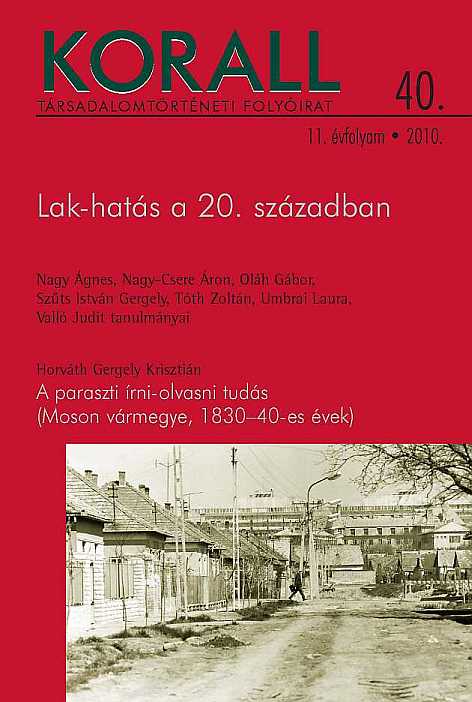„A szükséglakások felét menekültek kapják…” Érdekkonfliktusok és előítéletek az 1920-as évek első felének lakásügyeiben Miskolcon
‘Half of the emergency dwellings are issued to refugees…’: Conflicts of Interest and Prejudices in the Housing in the First Half of the 1920s in Misko
Author(s): István Gergely SzűtsSubject(s): History
Published by: KORALL Társadalomtörténeti Egyesület
Summary/Abstract: In connection with the consequences of the Treaty of Trianon, until recently, little has been known about the nearly 430 000 people who repatriated in Hungary from beyond the new borders. Their arrival and integration fundamentally influenced everyday life in Hungary, and especially in their host settlements. This study examines the first phase of integration, the process of acquiring living quarters in one specific city. Between 1916 and 1921 tens of thousands of refugees passed through Miskolc, one of the major traffic hubs of Northeast Hungary. About 3500-4000 of them settled here, and their accommodation and provision created serious challenges for local authorities. Due to the dire shortage of flats, they were forced to wait for the outcome of their housing application in railway wagons, storehouses and other non-residential buildings unfit for human dwelling. The supervision of housing was officially the remit of the Housing Bureau, which was established in 1917. However, due to the dearth of available flats, insufficient capacity, suspicious corruption cases, and the continuous attacks on their operation, the office was not able to perform this duty satisfactorily. As a result, the local housing market increasingly relied on informal channels and illegal ways. Naturally, this created serious tension not only between the refugees and residents, but also between various groups. Besides the authorities using their influence in these conflicts, most cases were characterised by personal attacks and deeprooted prejudices. The acute shortage of flats and the resulting tension were only relieved, albeit only to some extent, by the new building campaigns in the second half of the decade.
Journal: Korall - Társadalomtörténeti folyóirat
- Issue Year: 2010
- Issue No: 40
- Page Range: 114-133
- Page Count: 20
- Language: Hungarian

